| |
| |
Caption: Board of Trustees Minutes - 1869
This is a reduced-resolution page image for fast online browsing.

EXTRACTED TEXT FROM PAGE:
310 It is greatly hoped that the utility of crossing the Mauchamp with the American Merino will soon be tested by some breeder of the requisite capital and enterprise. Since writing the above paragraph I have seen the remarks of Hon. John P. Reynolds upon the Mauchamp Merino, in his able report upon the Paris Universal Exposition, and wish here to call attention to them as the opinions of a gentleman of enlarged and liberal views, and the result of a long study, having for its object the good of the agricultural interests of our whole country. Mr. Reynolds seems to entertain no doubt that the cross alluded to could be made profitable in this country, in view of the greatly increasing demand for fine combing wools, and cites the result of experiments in crossing them upon the Rambouillet sheep of France, in proof of the correctness of his conclusions.* LONG WOOLS. The long wool breeds are generally distinguished by great precocity, and in raising them the item of mutton is the prime consideration, and that of wool secondary; and in England, where are to be found the most perfect types of this variety, a remarkable success has been achieved in the development of those particular parts of the body giving the best meat, and in producing animals capable of being fattened with the greatest economy and at an early age. This branch of sheep husbandry, presenting as it does so inviting a field to the farmer, has been too long neglected. Of the long combing wools we consume annually some 6,000,000 pounds,f for a large proportion of which we are dependent upon the British Provinces, from whence we also draw largely for our supply of mutton. Since the abrogation of the Reciprocity Treaty with Canada this interest has received quite an impetus, and if properly fostered and protected will soon take its proper rank in the industrial economy of the country, RECIPROCITY TREATY WITH BRITISH PEOVINOES. And here let me remind you that a movement is on foot to re-establish the Reciprocity Treaty,, w^hich, if successful, will be a death blow to the long wool interest in the United States, and, by sympathy, will greatly injure the fine wool interest. The committee on Ways and Means, at the last session of Congress, reported in favor of referring the question of re-establishing the treaty to the Secretary of State, who is thought to be in favor of granting " free tickets " to such part of the world as he cannot buy. This reference, if agreed to by the House, is but one way of voting for the treaty, by dodging a direct vote against it, as Mr. Seward will of course recommend it to the Senate for ratification. The treaty as it formerly existed meant only free use of the New Foundland fisheries for the fishing States, and free lumber for New York, and so far as the agricultural interests of the country may be" * Eeport of John P. Reynolds to Governo. of Illinois, 1868. t Mudge' 8 Report.
| |